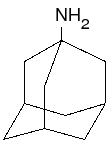Amantadine
Amantadine (1-aminoadamantane, sold as Symmetrel®) is an antiviral drug that was approved by the FDA in 1976 for the treatment of Influenzavirus A in adults. The drug has also been demonstrated to help reduce symptoms of Parkinson's disease and drug-induced extrapyramidal syndromes. As an antiparkinsonic it can be used as monotherapy; or together with L-DOPA to treat L-DOPA-related motor fluctuations (i.e. more...
, shortening of L-DOPA duration of clinical effect, probably related to progressive neuronal loss) and L-DOPA-related dyskinesias (choreiform movements associated with long-term L-DOPA use, probably related to chronic pulsatile stimulation of dopamine receptors). Amantadine has been shown to relieve SSRI-induced anorgasmia in some people, though not in all people.
It is a derivate of adamantane, like a similar drug rimantadine.
Mechanism of its effects
The mechanism of its antiparkinsonic effect is not fully understood, but it appears to be releasing dopamine from the nerve endings of the brain cells, together with stimulation of norepinephrine response.
The antiviral mechanism seems to be unrelated. The drug interferes with a viral protein, M2 (an ion channel), which is needed for the viral particle to become "uncoated" once it is taken inside the cell by endocytosis.
Misuse
Recently, amantadine is reported to have been used in China poultry farming in an effort to protect the birds against avian flu. In western countries and according to international livestock regulations, amantadine is approved only for use in humans. Chickens in China have received an estimated 2.6 billion doses of amantadine. Avian flu (H5N1) strains in China and southeast Asia are resistant to amantadine, but strains circulating elsewhere seem to be sensitive. If amantadine resistant strains of the virus spread, the drug of choice in an avian flu outbreak will likely be restricted to one of the scarcer and costlier oseltamivir or zanamivir, which work by a different mechanism and are less likely to trigger resistance.
Declining effectiveness
Early in the 2005/2006 flu season, the United States' Center for Disease Control found rates of amantadine resistance to be much higher than in previous seasons. Looking at samples from 26 states yielded the following findings:
A total of 193 (92.3%) of 209 influenza A(H3N2) and 2 (25%) of 8 influenza A(H1N1) viruses analyzed contained point mutations resulting in a serine-to-asparagine change at amino acid 31 (S31N) of the M2 protein that conferred adamantane resistance.
A resistance rate of 92% for the major flu strain was called "alarmingly high". The CDC issued an alert to doctors not to prescribe amantadine any more for the season.
Read more at Wikipedia.org



